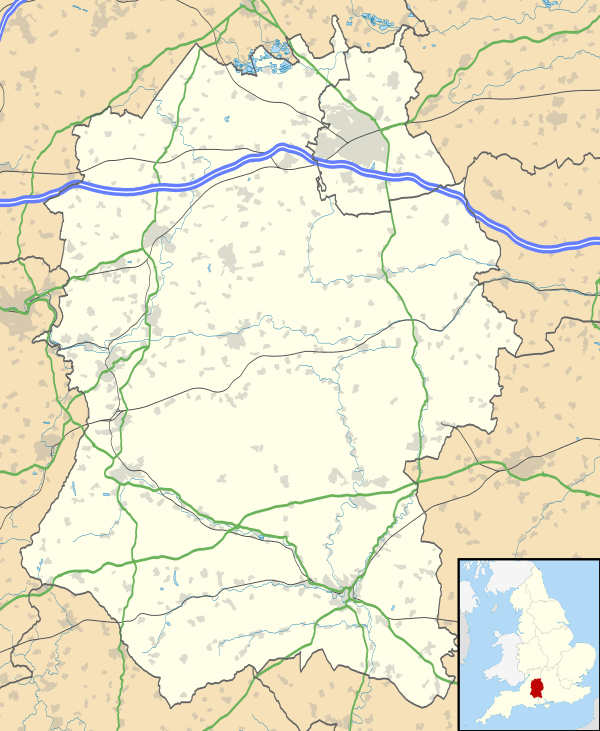Chicklade
| Chicklade | |
|---|---|
 All Saints' parish church | |
 Chicklade Chicklade shown within Wiltshire | |
| Population | 75 (2011 Census)[1] |
| OS grid reference | ST911345 |
| Civil parish |
|
| Unitary authority | |
| Ceremonial county | |
| Region | |
| Country | England |
| Sovereign state | United Kingdom |
| Post town | Salisbury |
| Postcode district | SP3 |
| Dialling code | 01747 |
| Police | Wiltshire |
| Fire | Dorset and Wiltshire |
| Ambulance | South Western |
| EU Parliament | South West England |
| UK Parliament | |
Chicklade is a small village and civil parish in Wiltshire in South West England. The village is on the A303 road, about 7 miles (11 km) south of Warminster. The parish includes the hamlet of Upper Pertwood.
The Great Ridge Wood, formerly also known as Chicklade Wood, is less than a mile north of the village, just over the parish boundary.
History
John Marius Wilson's Imperial Gazetteer of England and Wales (1870–72) describes Chicklade as follows:
CHICKLADE, a parish in Tisbury district, Wilts; 1¼ mile N by E of Hindon, and 5 S by-W of Heytesbury r. station. Post town, Hindon, under Salisbury. Acres, 1,039. Real property, with Hindon, Berwick-St. Leonard, and Fonthill-Gifford, £5,111. Pop., 143. Houses, 23. The property is divided among a few. The surface is hilly. The living is a rectory in the diocese of Salisbury. Value, £230. Patron, the Marquis of Bath. The church is good.[2]
On 22 October 1963 the prototype BAC One-Eleven aircraft G-ASHG flown by Mike Lithgow entered a deep stall and crashed near Chicklade, killing all seven crew. (See 1963 BAC One-Eleven test crash)
Churches
The Church of England parish church of All Saints was built in 1832 to designs in 12th-century style by J.B. Papworth. It stands on the site of a 12th-century church.[3]
The poet William Lisle Bowles was Vicar of Chicklade 1792-97.
Pertwood also had a 12th-century church, St Peter's, which was rebuilt in 1872. The ecclesiastical parish of Pertwood was separate until 1899 when it was united with Chicklade, then in 1921, Chicklade with Pertwood was united with Hindon parish. The church at Pertwood was declared redundant in 1972.[4]
Parish registers for Chicklade survive from 1722 and are kept in the Wiltshire and Swindon Archives.[5]
Local government
The civil parish does not elect a parish council. Instead the first tier of local government is a parish meeting, which all electors are entitled to attend.[6] The parish is in the area of Wiltshire Council unitary authority, which is responsible for all significant local government functions.
References
- ↑ "Chicklade Census Information". Wiltshire Community History. Wiltshire Council. Retrieved 22 March 2013. Note ONS raw data (as opposed to this County Council figure) is for an area 'too small to publish all data for reasons of confidentiality of living people' its parish data being combined with much of Hindon, Wiltshire into output area E00163258 so more demographic statistics will become available in a few decades from 2011
- ↑ Wilson & 1870–72
- ↑ Historic England. "Church of All Saints (1318426)". National Heritage List for England. Retrieved 27 March 2016.
- ↑ Crowley, D.A. (ed.). "Victoria County History - Wiltshire - Vol 13 pp105-114 - Chicklade". British History Online. University of London. Retrieved 27 March 2016.
- ↑ Chicklade, Wiltshire at genuki.org.uk
- ↑ "Chicklade Parish Meeting". Wiltshire Council. Retrieved 27 March 2016.
Sources and further reading
- Crowley, DA (ed); Freeman, Jane; Stevenson, Janet H (1987). A History of the County of Wiltshire. Victoria County History. 13: South-west Wiltshire: Chalke and Dunworth hundreds. Oxford University Press for the Institute of Historical Research. pp. 105–114. ISBN 978-0197227695.
- Wilson, John Marius (1870–72). Imperial Gazetteer of England and Wales. London & Edinburgh: A Fullarton & Co.
External links
![]()
- Wiltshire and Swindon Sites and Monument Record Information: Chicklade at history.wiltshire.gov.uk
- Chicklade at Google Maps